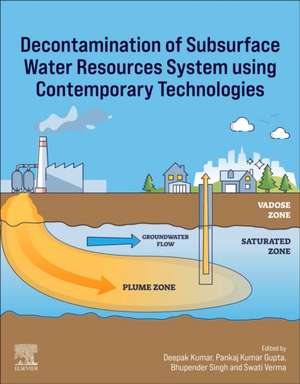Decontamination of Subsurface Water Resources System using Contemporary Technologies
Editat de Deepak Kumar, Pankaj Kumar Gupta, Bhupender Singh, Swati Vermaen Limba Engleză Paperback – mai 2025
This broad coverage ensures that readers gain a well-rounded understanding of the topic. Purchasing this book offers a unique opportunity to access up-to-date, comprehensive, and scientifically grounded insights into subsurface water decontamination. This book will inform the student, researcher, policymaker, or industry practitioner and contribute to positive change in the field of water resource management.
- Includes up-to-date assessment tools for water quality evaluation and advanced modelling techniques
- Contains unique resources on the restoration of surface water resources, with step-by-step analysis to guide students
- Covers theory and practice by offering global case studies with applications
- Offers thorough overview of Machine Learning (ML)/Artificial Intelligence (AI), GIS and remote sensing, and sensors application to achieve sustainable groundwater management
Preț: 647.21 lei
Preț vechi: 843.33 lei
-23% Nou
Puncte Express: 971
Preț estimativ în valută:
123.88€ • 134.61$ • 104.13£
123.88€ • 134.61$ • 104.13£
Carte nepublicată încă
Doresc să fiu notificat când acest titlu va fi disponibil:
Se trimite...
Preluare comenzi: 021 569.72.76
Specificații
ISBN-13: 9780443266393
ISBN-10: 0443266395
Pagini: 326
Dimensiuni: 216 x 276 mm
Editura: ELSEVIER SCIENCE
ISBN-10: 0443266395
Pagini: 326
Dimensiuni: 216 x 276 mm
Editura: ELSEVIER SCIENCE
Cuprins
Section I: Emerging pollutants in subsurface water resource systems
1. Fate and Transport of Emerging Contaminants in the Vadose Zone
2. Emerging contaminants and their behaviour in aquifer systems
3. Colloid-facilitated contaminant transport through sub-surface porous media
4. Research on migration characteristics of CML colloid co-transported carcinogenic Cr(VI) in a two-phase porous medium incorporating probabilistic human health risk assessment
Section II: Remediation technologies for contaminated subsurface water resource systems
5. Phytoremediation for extraction of heavy metal from contaminated soil
6. Bioremediation Strategies for Vadose Zone Contaminant Cleanup
7. An Overview on Cost Analysis of In-Situ Remediation Technologies for Sub Surface Management
8. Electrocoagulation treatment of landfill leachate: influence of electrodes and characteristics
9. Remediation strategies for soil heavy metal contamination in soil
10. Field scale remediation technologies for vadose zone contaminated with chromium contaminants
Section III: Case study on Groundwater Assessment and Contaminant transport
11. Soil-Water Contamination at COPR Sites and in Adjoining Agricultural lands: Remediation Strategies and Practices
12. Estimation of surface and groundwater interaction by stable isotopic techniques – a case study on Chengalpattu district – IT corridor
13. Assessment of groundwater vulnerability of the Rupnagar, Punjab, India using DRASTIC-LUH model and electrical resistivity tomography
14. Subsurface investigation for groundwater resource assessment: A case study of Dehola village, Haryana, India.
15. Identification of the best yield point for groundwater using the ERT method
16. Fuzzy Logic Decision Support System for In-Situ Remediation of Contaminated Aquifer
17. Response of groundwater to dry and wet rainfall spells in different climatic zones of India
18. Geospatial assessment of groundwater quality using water quality index
19. Water quality assessment of springshed of outer Himalaya's foothills: A case study from Uttarakhand
20. Global collocation-based Meshfree simulation model for groundwater contaminant transport
Section IV: Policies framework for subsurface water resource management
21. Policy framework to control subsurface contamination
22. Constitutional laws for subsurface water pollution
23. Public participation to manage contaminated aquifer
24. Aquifer management for achieving various objectives of sustainable development goal (SDG)
1. Fate and Transport of Emerging Contaminants in the Vadose Zone
2. Emerging contaminants and their behaviour in aquifer systems
3. Colloid-facilitated contaminant transport through sub-surface porous media
4. Research on migration characteristics of CML colloid co-transported carcinogenic Cr(VI) in a two-phase porous medium incorporating probabilistic human health risk assessment
Section II: Remediation technologies for contaminated subsurface water resource systems
5. Phytoremediation for extraction of heavy metal from contaminated soil
6. Bioremediation Strategies for Vadose Zone Contaminant Cleanup
7. An Overview on Cost Analysis of In-Situ Remediation Technologies for Sub Surface Management
8. Electrocoagulation treatment of landfill leachate: influence of electrodes and characteristics
9. Remediation strategies for soil heavy metal contamination in soil
10. Field scale remediation technologies for vadose zone contaminated with chromium contaminants
Section III: Case study on Groundwater Assessment and Contaminant transport
11. Soil-Water Contamination at COPR Sites and in Adjoining Agricultural lands: Remediation Strategies and Practices
12. Estimation of surface and groundwater interaction by stable isotopic techniques – a case study on Chengalpattu district – IT corridor
13. Assessment of groundwater vulnerability of the Rupnagar, Punjab, India using DRASTIC-LUH model and electrical resistivity tomography
14. Subsurface investigation for groundwater resource assessment: A case study of Dehola village, Haryana, India.
15. Identification of the best yield point for groundwater using the ERT method
16. Fuzzy Logic Decision Support System for In-Situ Remediation of Contaminated Aquifer
17. Response of groundwater to dry and wet rainfall spells in different climatic zones of India
18. Geospatial assessment of groundwater quality using water quality index
19. Water quality assessment of springshed of outer Himalaya's foothills: A case study from Uttarakhand
20. Global collocation-based Meshfree simulation model for groundwater contaminant transport
Section IV: Policies framework for subsurface water resource management
21. Policy framework to control subsurface contamination
22. Constitutional laws for subsurface water pollution
23. Public participation to manage contaminated aquifer
24. Aquifer management for achieving various objectives of sustainable development goal (SDG)
